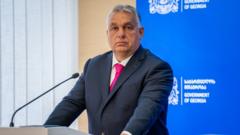Hungarian Prime Minister Viktor Orban's recent trip to Georgia has sparked significant controversy after he praised the country's disputed elections as "free and democratic." His remarks came just days after the Georgian ruling party, Georgian Dream, was declared victorious in an election rife with allegations of fraud. Orban's comments stand in stark contrast to the European Union's position, which has indicated that the elections were not conducted fairly and has called for an investigation into numerous reported violations.
Georgia's pro-Western president, Salome Zourabichvili, has rejected the election results, claiming that a "Russian special operation" aimed to sway the vote. Orban, however, echoed the sentiments of Georgian Dream leadership, suggesting that accusations surrounding the electoral process are part of a broader narrative that discounts conservative victories. "European politics has a manual," he stated, highlighting the apparent double standards in evaluating election results based on the winning party's political leanings.
Despite Orban's reassurance, the international community expressed deep concern. Both the United States and the European Union urged a thorough investigation into reports of violence, intimidation, and notable irregularities in the electronic voting system. Opposition parties in Georgia maintain that the elections were "stolen," undermining the country's aspirations for Western integration.
Mass protests erupted in Tbilisi as thousands of Georgians took to the streets, voicing their discontent with the electoral outcome. The atmosphere was further intensified by claims from independent monitoring groups, such as "My Vote," which outlined serious violations during the voting process. According to their reports, there were instances of vote-buying, ballot-stuffing, and coercion, severely compromising the integrity of the election.
In response, the Georgian government has consistently denied any wrongdoing and maintained that the elections adhered to legal principles. The beleaguered election commission announced plans to recount votes in selected precincts but faced skepticism from critics who argue that the system is fundamentally flawed and manipulated by the ruling party.
Observers worry that the continuing political unrest could hinder Georgia's relations with the West while potentially pushing the country closer to Russia's sphere of influence. Transparency International has called the state a "captured" democracy, highlighting the systemic challenges in ensuring credible governance and electoral integrity in Georgia.



















